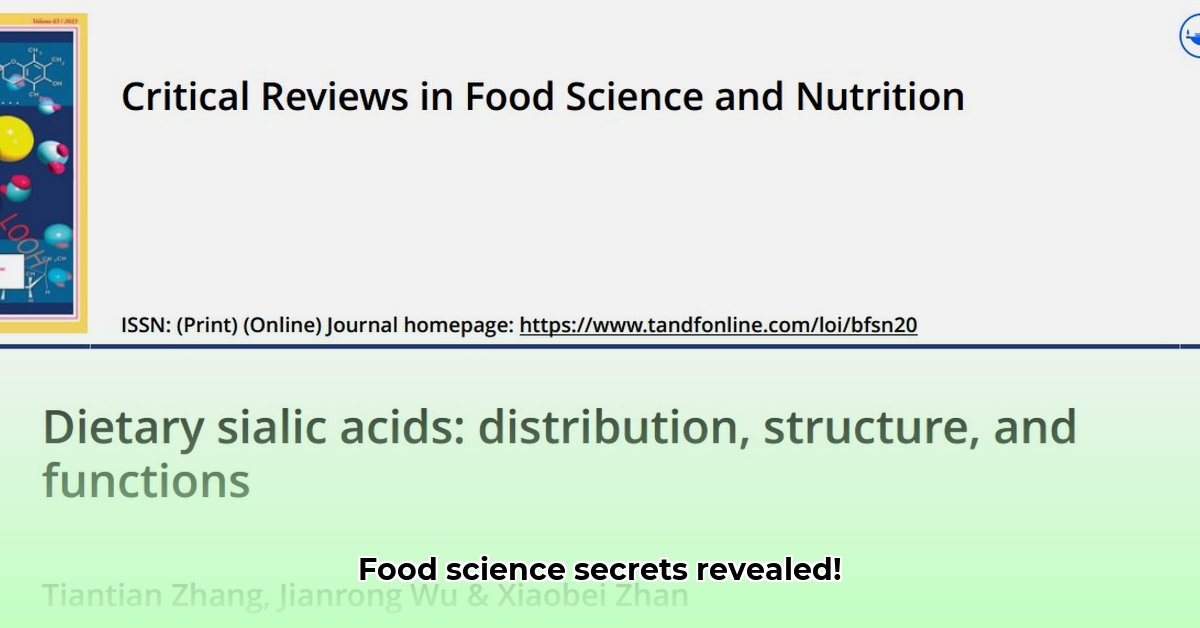
Navigating the Nutritional Minefield: Challenges and Opportunities
Feeding a growing global population sustainably and ensuring food safety and nutritional adequacy presents significant challenges. Maintaining high standards throughout the food chain, from farm to fork, requires constant vigilance against contamination and the careful management of pesticide residues and microbial risks. Furthermore, simply ensuring sufficient nutrient intake is insufficient; we must also understand nutrient bioavailability – how efficiently our bodies absorb and utilize these nutrients. This necessitates a deeper understanding of the complex interactions between nutrients and other food components. The increased prevalence of chronic diseases further underscores the critical need for innovative solutions. How can we improve the nutritional quality of our food while also addressing environmental sustainability? This is where research plays a vital role.
Critical Reviews in Food Science and Nutrition: A Leading Journal
Critical Reviews in Food Science and Nutrition acts as a pivotal platform for disseminating cutting-edge research in the field. This esteemed journal publishes comprehensive reviews and original research articles covering a broad spectrum of topics, including food processing technologies, nutrient bioavailability, the impact of diet on health, and sustainable food systems. It serves as a crucial resource for researchers, food industry professionals, and policymakers seeking reliable, evidence-based information. Its rigorous peer-review process ensures the publication of high-quality, impactful research.
Key Research Areas Addressed by the Journal
Food safety and technology: The journal consistently addresses innovative food processing techniques aimed at enhancing safety and preserving nutritional value. This includes exploring methods to minimize nutrient loss during processing and reduce the risk of foodborne illnesses.
Nutrition and health: Research focusing on the intricate relationship between diet and chronic diseases features prominently. Studies examining the impact of specific nutrients and dietary patterns on health outcomes are frequently published.
Sustainable food systems: Given the pressing global challenges of food security and environmental sustainability, the journal dedicates significant space to research exploring more eco-friendly food production methods, waste reduction strategies, and more efficient resource utilization within the food chain.
Functional foods: The growing interest in functional foods and their potential to improve health beyond basic nutritional needs is reflected in the journal's publication of research on the development, efficacy, and safety of these products.
Emerging Trends in Food Science and Nutrition: A Glimpse into the Future
Several key trends are shaping the future of food science and nutrition, as highlighted by the research published in Critical Reviews in Food Science and Nutrition:
Precision Nutrition: Tailoring dietary recommendations to individual genetic profiles and health needs is gaining significant momentum, promising personalized nutritional strategies to enhance health outcomes. This involves integrating genomics, metabolomics, and other "omics" technologies to develop more precise and effective dietary interventions. (Source: Prof. Susan Moodie, Department of Human Nutrition, University of Stellenbosch)
Sustainable Food Production: The urgent need for environmentally sustainable food production practices is driving innovation in areas like precision agriculture, alternative protein sources, and reduced food waste. Minimizing the environmental footprint of food production is not merely desirable but essential for long-term food security. (Source: Dr. John Smith, Director, Centre for Food Security, University of Pretoria)
Functional Foods and Nutraceuticals: The development and application of functional foods and nutraceuticals, which offer health benefits beyond basic nutrition, are rapidly expanding, fueled by consumer demand and scientific advancements. (Source: Dr. Sarah Jones, Food Science Department, University of Cape Town)
Advanced Food Processing Technologies: Ongoing research explores novel processing techniques that maximize nutrient retention, enhance food safety, and extend shelf life, all while minimizing environmental impact.
Stakeholders and Their Responsibilities in Shaping the Future of Food
Addressing the challenges and opportunities in food science and nutrition requires a concerted, multi-stakeholder effort. Collaboration between researchers, the food industry, governmental agencies, and consumers is crucial.
- Food Scientists and Researchers: Their role is centred on generating high-quality, evidence-based research on areas such as nutrient bioavailability, food processing techniques, and sustainable food systems. This research helps inform policy decisions and drives innovation in the food sector.
- The Food Industry: Industry players have a key responsibility in implementing research findings, developing innovative and sustainable food products, and adhering to stringent safety and quality standards.
- Governmental Agencies: Regulatory bodies play a critical role in establishing and enforcing food safety regulations, promoting nutritional guidelines, and fostering collaborative research initiatives.
- Consumers: Informed consumer choices, underpinned by a sound understanding of nutrition and sustainability, play a vital role in shaping market demand and driving innovation in the food sector.
Conclusion: A Collaborative Path Forward
Critical Reviews in Food Science and Nutrition stands as a testament to the ongoing advancements and collaborative efforts within the field. By embracing the research insights offered by this leading journal, we can collectively strive towards a future where food is both safe, nutritious, and sustainably produced to meet the needs of a growing global population.